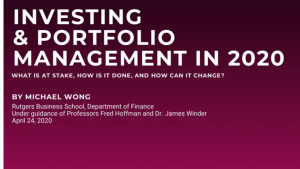Wong, Michael: Investing & Portfolio Management in 2020
Title: Investing & Portfolio Management in 2020: What is at Stake, How is it Done, and How Can it Change?
Name: Michael Wong
Major: BAIT and Finance
School affiliation: Rutgers Business School
Programs: Honors College Capstone
Other contributors: Fred Hoffman, James Winder
Abstract: Retirement planning is becoming more complex due to longer lifespans, increased portfolio choices, and conflicting priorities among households. Households are not adapting to these changes fast enough, resulting in unexpected spending cuts during old age. In response, this project harnesses the cycle-based frameworks used by hedge fund managers Howard Marks and Ray Dalio and tests their usefulness to retail investors. The team created a portfolio designed to outperform during recessions using publicly available equity ETFs, U.S. Treasuries, corporate bonds, mortgage-backed securities, derivatives, and commodity futures. In addition, short-term arbitrage strategies were tested to leverage the predictable buying behaviors of index-based ETFs.
Over a holding period of 6 months, the portfolio outperformed a benchmark comprising 60% equities, 30% fixed income, and 10% cash by 39 basis points. Short-term arbitrage strategies netted a positive holding period return, but this was due to increased volatility caused by COVID-19 rather than reproducible opportunities. Accordingly, our group affirms that long-term cycle-timing remains the key driver in portfolio outperformance. As such, everyday portfolio managers seeking to gain excess returns in their retirement portfolios should ignore short-term asset pricing inefficiencies as long as their long-term mix is in sync with broader market cycles.
